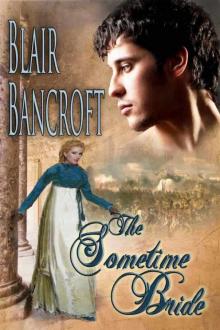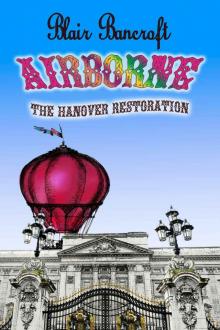- Home
- Blair Bancroft
Airborne - The Hanover Restoration
Airborne - The Hanover Restoration Read online
Chapter 1
London, 1840
I stood on the platform at Euston Station, my eyes fixed on Elbert, the steam locomotive that was about to whisk me away to a whole new world. A terrifying new world, where only Elbert was familiar. Love shone from my eyes as I gazed at his sleek lines, the intricate engineering, the sheer power of him. I knew each and every part. Pistons, piston rods, connecting rods, side rods, coupling rods—all patiently waiting for the engineer’s signal to move. My gaze rose to the tall black smoke stack, crowned in red, then slid slowly over the bright green engine with its four steel wheels, the front pair smaller than the back. A pot-bellied boiler, painted red, added a distinct bulge at the rear, where the engine joined the coal tender.
Elbert. Papa’s crowning achievement.
I was only fourteen when I’d given Elbert his name. I stood in the warehouse where he was being assembled, scowling at the shiny brass plate on the locomotive’s side, which read: “LONDON & BIRMINGHAM.” I played with the letters, a jumble of possibilities flitting through my mind. Lon, Don, Noddie, Noodle, L.B., L.Bir, Elbirm . . .
Elbert. Yes!
Today, six years later, I clutched my carpet-bag tight as my eyes misted with tears. You’ve probably heard of my papa, Josiah Galsworthy. He might not have been the first to design a steam locomotive, but he refined and perfected the concept, and this engine, specifically designed to pull passenger cars from London to Birmingham and back again, was all his. And now . . .
I fished a handkerchief out of my reticule and wiped my eyes. When I looked up, the man who had been shoveling coal into the boiler ducked his head, returning to his job as if he’d never noticed my moment of weakness. Drat! Then again, being caught teary-eyed was better than a perfect stranger discovering that the love of my life was a steam engine. That Araminta Galsworthy had reached the nearly-on-the-shelf age of twenty and, so far, the love of a fellow human being—other than Papa and, a very long time ago, Mama—had passed me by.
A shrill whistle pierced my chagrin. The train was leaving! Under the conductor’s stern eye, I climbed into the closest of the two first-class carriages and squeezed myself into the last vacant seat next to a sharp-nosed female who offered a curt nod before returning to the perusal of a much-worn Bible. I swallowed a sigh. If I’d been less vain and not donned two petticoats over my crinoline in an attempt to make my stark black traveling dress look modish, I would not feel so squeezed. And if I’d worn a less-stylish bonnet with a wider brim, I could have hidden inside it and ignored the other passengers altogether.
Selfish wretch! Just because I was in mourning and embarking on a journey to the great unknown didn’t give me leave to resent my fellow passengers. The railways spreading over the English countryside were a transportation miracle, and, as Papa always said, “It’s early days yet, Minta. Give us time, and we’ll do better.”
But at the moment, I had to admit, the first class carriages on the London and Birmingham Railway were little better than a stage coach, and almost as bumpy. And what if I had to travel second class where the poor souls rode in the open, exposed to the elements?
A jerk, a heave. A puff of smoke easily penetrated the carriage, setting my eyes to watering once again. After two more shrill blasts of his whistle, Elbert began to move ever so slowly, before settling to a steady rhythm, wheels clanking over the rails. Evidently, the industrious coal heaver had done his job well, building up a good head of steam. With every inch away from the Greek Revival elegance of London’s Euston Station, the stark reality of the unknown crept in, overwhelming all thoughts of Papa’s wonderful engine.
The heavens seemed to echo my misgivings as silvery gray skies darkened , roiling clouds conjuring up a dire, formless vision of my destination, Stonegrave Abbey. Surely a dark, forbidding place, for the Abbey had to be one of the multitude of religious orders seized by Henry VIII, then granted to friends and sycophants in the midst of the bloody violence and hatred that marked his determination to sever England from the Catholic Church.
And the Abbey’s owner, Julian Stonegrave, Baron Rochefort, sounded almost as bad. Not that the poor man could help the names fate wished on him, but I could not be easy.
If only he were a tenth of the kindly gentleman Papa had been.
All I knew of Lord Rochefort was that he was a crony of my father’s, a fellow inventor. Papa and the baron had carried on a lively correspondence for years, and at some time they must have met, because in his final moments Papa had assured me he was leaving me in good hands. Nonetheless, I had serious doubts. I knew his kind. The baron was going to expect me to be a typical young lady, frivolous in appearance, frivolous in thought. A sweet, well-behaved girl, out of sight, out of mind. Marry her off as soon as possible, that’s what he’d think.
In other words, he expected me to be everything I wasn’t. Would never be. Didn’t want to be. Baron Rochefort was going to quash my grand dreams, I knew it. Just like an ant at a picnic, and never even notice how drastically he’d erred.
Gasps echoed through the carriage as rain clanged down on the metal roof just above our heads, waterfalling down the windows, obscuring the view of the lush green countryside north of the city. I thought of the poor passengers in second class, and winced. When steam locomotives were stronger, better able to pull heavy loads, Papa had said, every carriage would have a roof. Until then, I could only be grateful for my squeezed space in first class.
I closed my eyes, shutting out the other passengers, but that only seemed to exaggerate the bone-rattling bumps and jerks as the four-carriage train chugged its way toward Rugby, Coventry, and Birmingham. I opened my eyes, pressed my nose to the glass and attempted to peer past the rain streaming down the window.
At Watford station, I caught a glimpse of a large poster displayed on the wall. A full-face portrait of a stern Lord Protector keeping an eye on his subjects. The same portrait he’d been using for the past eleven years, ever since His Grace, the Duke of Wellington, seized the reins of government and proclaimed himself Lord Protector of the realm. Although I had grown up with the new order, Papa had never accepted the fall of the House of Hanover.
On his more optimistic days, Papa admitted that Wellington might have been justified when he led the move to oust the much-hated George IV. No one could deny the duke was a vast improvement over the Hanovers—George III a madman, his sons shocking examples of every vice Britain did not want in its monarchs. But . . .
For Papa there was always a but. Britain had been a monarchy for a thousand years, he would declaim in stentorian tones. The new order simply wasn’t right. Not right at all. And the duke’s good intentions, Papa pontificated with all the fervor of a dedicated intellectual, had wavered, then gone astray. On occasion, Papa even went as far as likening the current regime to Bonaparte creating his own downfall when he named himself Emperor Napoleon I.
There had been nascent rebellions against the duke’s regime, of course—never more than talk. But finding a rallying point—a viable claimant to the throne—was a challenge. Incredible as it seemed, George III’s seven sons had produced almost no legitimate children. Which, as Papa huffed, was indication enough of how far the Hanovers had fallen. (In spite of his monarchist leanings, Papa was ever a realist.)
As the wheels clacked and the rain came down, I passed the time recalling what little I knew of the dethroned House of Hanover. George IV and his next eldest brothers, the Dukes of York and Clarence, had gone into exile and were now deceased. The monarchists tended to ignore the claim of the Duke of Cumberland, whose moral compass was even worse than his unlamented oldest brother, George. And since he had fled to the continent directly after the coup, claiming the title of
King of Hanover, the most serious talk of restoration of the monarchy usually centered on the Duke of Cambridge and his son George. But the Lord Protector had not earned the title of Duke of Wellington by sitting on his backside at Horse Guards. So far, he had encountered no difficulty handling threats to his regime.
And yet . . . I sometimes wondered if Papa had given more than lip service to his royalist leanings. Just my imagination running wild, I supposed—as it often did. And even if Papa had been up to his neck in treason, it no longer mattered, for he was well beyond the Lord Protector’s reach.
I dragged my thoughts back to reality. We were in farm country now, acre after acre of small fields, each displaying a different shade of green or fallow brown and gold. The Lord Protector’s portrait stared back at me from three more stations: Kings Langley, Hemel Hempstead, Berkhamsted. I was close now, close to discovering my fate. I clutched my black-gloved hands tightly in my lap. I gritted her teeth and thought about not getting off. I’d just go all the way to Birmingham and . . .
And then . . . nothing. I was an orphan, with no control over my life, my inheritance entirely in the hands of Baron Rochefort. My choices were few. I could get off the train where I was supposed to, I could join the multitude of faceless female automatons toiling in a factory, I could make my living on my back.
So no choice. Not really.
“Tring. Next stop, Tring. Tring!” The conductor’s voice echoed through the carriage, pronouncing the death knell to two decades of my life.
I stood, retrieved my carpet bag from the overhead rack, and prepared to exit the carriage. The sharp-nosed Bible lady offered a nod of dismissal. My lips quivered as I returned her polite, if cool, farewell with a smile that never quite blossomed into life.
Courage, my dear, courage. It’s not what you think. As I stepped down onto the platform, I could swear I heard Papa’s voice, but the only person waiting on the platform might have stepped straight out of one of Sir Walter Scott’s novels. A shocking anomaly in the midlands county of Hertfordshire. A brawny man of middle age, he was dressed in full kilt, from his black Scottish bonnet to his colorful plaid, with a dagger prominently displayed against one knee-high white sock. He lacked only a claymore and bagpipe to complete the look George III had attempted to erase from the face of the earth.
The resurrection of the kilt, I had to concede, was one of the few things George IV had done right. Influenced by Sir Walter Scott, he had commissioned a portrait of himself in full Scottish attire, adding the final seal of approval to traditions banned after Culloden. Braw men in skirts. With nothing underneath. Or so some said.
Scarlet stained my cheeks as the man approached, and I longed to sink through the platform. How gauche could I be? Fortunately, it was warm for May and I hoped he might think I was suffering from the crowded conditions on the train.
“Miss Galsworthy?” I dropped a small curtsey, which his magnificence seemed to warrant. “Nay, lass, no curtsies for me. I’m but the steward, come to fetch ye to the Abbey. Angus Drummond’s m’ name. You may address me as Drummond.”
His words might be formal, but I caught a twinkle in his eye. I feared he’d caught me out, though surely the other ladies he knew never had such improper thoughts. Of course, he probably knew some that weren’t . . .
Araminta Christabel Galworthy, concentrate! Being raised in a household where Papa and his assistants far outnumbered the females had broadened my horizons. Considerably. I had not only heard banter about kilts but other things as well—some naughty, some treasonous, and a few downright frightening. I was a lone female walking into God alone knew what. And if Angus Drummond was any indication, nothing was going to go as I’d pictured it.
The Scot glanced over his shoulder, signaling to a station porter who—ah!—he was using one of the flatbed carts with small wheels which Papa had designed. He’d insisted the London & Birmingham have one available at each station to handle large pieces of luggage—in this case, the trunk which held all my worldly possessions.
Papa, I need you!
“This way, Miss.”
Dutifully, I walked down the platform in the direction Drummond indicated. I caught a glimpse of a modest river and a stone bridge nearby, the green of trees and bushes. Neat brick cottages with flowers just coming into bloom.
Not London. Very far from London.
A wooden walkway extended from the end of the platform, and beside it stretched a set of narrow gauge tracks. Sitting on the tracks was something that looked a bit like a second-class carriage. In miniature. As did the attached engine and coal tender. The carriage had four bench seats, one behind the other. Drummond swung open the door of the first seat, which was rather like the door to a church pew, and helped me in. I suppose each seat was designed for two, but the width of my black gabardine skirt took up the entire space. Drummond shut the door and latched it, while the porter canted my trunk into the space behind me.
Drummond checked the gauges in front of him, nodded, grasped a lever, and off we went, drawn over custom-made tracks by a locomotive one-quarter the size of Elbert. An adult toy? Yet it functioned perfectly, puffing along beside the river and rapidly leaving the village of Tring behind. Cultivated fields stretched as far as the eye could see on both sides of the river, with only an occasional low hill to break the monotony, until, suddenly, we plunged into the shade of a goodly stand of trees, at least enough to be called a woods instead of a copse. Lovely. Better than Regency Park, I had to admit. Not that I could hear birds over the rhythmic sound of the engine rods or the clatter of our wheels on the tracks, but I knew they were there. And the trees—so many trees—I’d have to learn their names.
No, no, no! I didn’t want to be a country girl. This was not my milieu. Insidious, that’s what it was. Enticing me with a miniature railway, then dangling a forest in front of me. It wasn’t fair.
But I’d known the baron was an inventor. Yet I’d thought—yes, I admit it—I’d thought he was just another noble dilettante, playing at invention. But this toy train was . . . noteworthy. A proper welcome for the daughter of Josiah Galsworthy.
We came out of the trees, and I almost screamed. I’m not a screamer, really, but the sight of a massive stone wall a scant ten feet in front of us was surely enough to shake the strongest nerves. Drummond never slowed the engine’s pace. We plunged straight through the wall, double wooden gates swinging wide at the engine’s touch. And there it was, spread out on a low rise of land a hundred yards away. Stonegrave Abbey. A sprawling mass of ancient gray stone, incongruously topped by what appeared to be three floors of the honey gold sandstone that distinguished the architecture in Oxford and Bath. I’d spent most of my life in a narrow, newly constructed townhouse on the northern edge of Regency Park, but Stonegrave Abbey . . . Stonegrave Abbey dwarfed even Buckingham Palace, its foundations as ancient as four or five hundred years.
Oh. My.
Drummond turned his head, flashing an encouraging smile and waving his free hand toward the Abbey. House proud. Well, he had a right to be. Not that Stonegrave Abbey was as graceful or handsome as a home built in one style from the ground up, but it was impressive. I’d need a map to find my way around.
After rumbling past the somber stone walls of the Abbey’s ground floor, Drummond brought the small locomotive to a halt before an entrance at the rear. The massive carved wooden door, the only opening in a windowless eight-foot wall of stone, was more intimidating than welcoming. I could easily imagine young men, some of them mere boys, quailing as they stood before the door, knowing that only death could free them from this place.
Goosebumps.
Too much imagination, my besetting sin. Undoubtedly, most of the young men went with a ready will. I hoped.
“If you’ll follow me, Miss,” Drummond said as he unlatched the door to my compartment and handed me out. I was beginning to feel like a tail dragging from the Scotsman’s kilt, but I did as I was told.
The carved oak door opened into a vast stone-walle
d corridor with steps leading down to a level at least six feet below the ground. I blinked in the sudden dimness, grateful when Drummond took my elbow and guided me down the stairs.
“Lord Rochefort wishes to greet you himself.” Drummond pulled a tasseled cord that hung from the ceiling. “I’ll be off now, seeing your trunk to your room.” For the first time he seemed a bit ill at ease, fidgeting a moment with the great silver buckle on the white belt draped catty corner across his chest. “Ye’ll find this household a bit strange perhaps, Miss, but there’s nothing to fear. Good people live here. They’re just a wee bit . . . different.”
Oddly, I was relieved. “Different is a word I understood. “Mister . . . ah–Drummond. I will do my best to adapt.”
“Very good, Miss.”
I heard an odd hiss, a faint slithering sound. Dear God, what now?
I’d thought the miniature railway amazing. This contraption was in a whole new category. A small single-seat vehicle slid into view—just a single seat with a horizontal hand-hold bar in front. “If you’ll board, Miss,” Drummond said, “I will demonstrate how it works.”
Obviously, this was my day to be amazed. I, who had thought myself a sophisticated Londoner, raised in a free-thinking household where talk of exceedingly odd inventions was a daily occurrence . . . I, who thought herself inured to surprises, simply gaped. I’d missed the single rail fitted in the stone floor, but, beyond that, how on earth did this amazing device work?
“Miss . . . Miss?” Drummond was holding out his hand. “Allow me to take your bag, Miss. I’ll see it gets to your room along with your trunk.”
I handed him my carpet bag but continued to eye the seat on the mechanical device with some trepidation. It did not appear remotely adequate to accommodate a crinoline, two petticoats, and a traveling costume. “Clockwork?” I asked.
“I’m sure I can’t say, Miss. I let his lordship have his little secrets.” Drummond held out his free hand, ready to help me onto the mechanical marvel.

 Sorcerer's Bride (Blue Moon Rising Book 2)
Sorcerer's Bride (Blue Moon Rising Book 2) Orange Blossoms & Mayhem (Fantascapes)
Orange Blossoms & Mayhem (Fantascapes) Royal Rebellion
Royal Rebellion The Sometime Bride
The Sometime Bride A Season for Love
A Season for Love Death by Marriage
Death by Marriage Tarleton's Wife
Tarleton's Wife Limbo Man
Limbo Man Airborne - The Hanover Restoration
Airborne - The Hanover Restoration The Harem Bride
The Harem Bride Lady Silence
Lady Silence Shadowed Paradise
Shadowed Paradise The Last Surprise
The Last Surprise Paradise Burning
Paradise Burning Florida Knight
Florida Knight A Gamble on Love
A Gamble on Love The Bastard Prince (Blue Moon Rising Book 3)
The Bastard Prince (Blue Moon Rising Book 3)